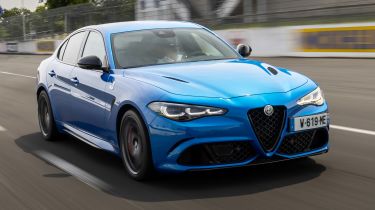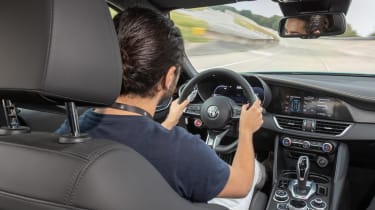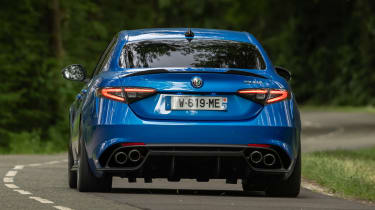New Alfa Romeo Giulia Quadrifoglio 2023 facelift review
The updated Alfa Romeo Giulia Quadrifoglio is better than ever, with a unique appeal and serious performance

Verdict
The Alfa Romeo Giulia Quadrifoglio has become one of those timeless performance cars that only seem to get better with age. Yes, it’s feeling dated in some areas, but its fundamental brilliance has only been sharpened with a touch more composure and consistency thrown in. Beyond the hard facts, the lightweight, sharp steering and charismatic Giulia Quadrifoglio is more desirable than ever.
This year represents 100 years since Alfa Romeo’s famous four-leaf clover, or Quadrifoglio, appeared on one of its pre-war Formula 1 racing cars. While the emblem has only been used sporadically over the century, more recently it’s found a home on the front wings of Alfa Romeo’s Giulia and Stelvio models, marking out the top-tier high-performance versions of their respective ranges.
As part of the brand’s centenary celebrations, Alfa Romeo has revealed updated versions of both Quadrifoglio cars, and it’s the Giulia we’re driving here. It features a few small but very important changes, applied to a model in a fast-moving class that’s been on sale here in the UK since 2018. These include a new fully mechanical locking rear differential that’s been fitted alongside a collection of small geometry changes to the front and rear suspension.
Used - available now

2023 Polestar
2
28,503 milesAutomaticElectric
Cash £23,100
2022 Nissan
Qashqai
21,203 milesManualPetrol1.3L
Cash £19,000
2022 Toyota
Corolla
14,897 milesAutomaticPetrol1.8L
Cash £16,663
2024 Volkswagen
Golf GTD
10,576 milesAutomaticDiesel2.0L
Cash £26,697Under the carbon fibre bonnet you’ll still find Alfa’s twin-turbocharged 2.9-litre V6 petrol engine, now producing 512bhp, up 9bhp on the old car thanks to tweaks to the engine management system. Torque is also strong at 600Nm, available right across the main chunk of the rev-band. This engine is connected to the same eight-speed automatic transmission, sending power exclusively to the rear wheels.
Visually, the new Quadrifoglio can be identified thanks to its three-plus-three headlights that feature Matrix LED beams and new grille mesh on the front bumper. Inside, the car’s previous analogue dials have also made way for a very slick high-resolution digital display that sits neatly within the cowled dashboard. These new changes don’t seem like a lot in isolation, but collectively they do lift the Giulia, which has never been as feature-packed or fancy as any of its key performance saloon rivals from BMW or Mercedes.
The benefit of this relative simplicity is felt in the Giulia’s 1,585kg kerbweight, which was impressively trim back at its launch, but in a class increasingly occupied by heavy hybrid cars, such as the 2,100kg C 63 AMG, the Alfa feels positively featherweight nowadays. In fact, it’s a number that completely defines the Giulia, because at any speed, and in any of its four drive modes, it drives beautifully. The ultra-fast steering together with superb front-end grip makes it feel so much more agile and responsive than many of its rivals. Whereas the (still very impressive) BMW M3 Competition bludgeons its way down a difficult road, the Alfa seems to pick it apart lightly, yet without feeling remote or disconnected.
Over particularly challenging roads the pre-update Quadrifoglio’s compliance could cause some issues, finding the limit of its suspension travel all too easily, but this new 2023 car feels like it’s been given a touch more support without compromising on the exceptional fluidity. As with previous models, the dampers can be altered separately from its drive mode, but the medium Sport damper setting offers the most impressive balance.
When in Dynamic or Race, the whole powertrain comes alive, with a resonant bass emitted from the exhaust and a palpable buzz and vibration from within the cabin. The engine’s not musical in the traditional sense, but sounds authentic and resonant, with occasional whistles and barks coming from both ends.
Our test car was fitted with the optional £3,250 Akrapovic exhaust system, which we know from experience adds a little drama to the whole package, but isn't absolutely necessary. One option box we would say is worth ticking is the £3,250 carbon-backed bucket seats, as they usefully lift the amount of lateral support over the standard items, while also making the interior feel extra special.
There are a couple of flaws in the dynamic package as the brakes still lack feel and progression. This is something that you quickly tune into, though, and is far from being a deal breaker. The other is the automatic transmission that’s now merely fast, rather than exceptional, as in the case of BMW’s automatic M3.
The interior is also still something of a bugbear, especially compared with the newer BMW. Cabin quality is only ok, and despite being brightened up with some new carbon-fibre trim, it still feels like the weakest part of the package. The new dial pack is a welcome addition, as it’s crystal clear and responsive, plus it’s able to be set up to display similar analogue dials to those used in Alfa’s sports cars from the sixties.
To drive, then, the Giulia Quadrifoglio has never been better, and while as a package it might lack the depth of a modern M3 Competition, its character remains intact. If you’re the sort of super-saloon buyer that’s sold more on numbers and toys, the now £100,000 Mercedes-AMG C 63 is probably more up your street, but as the AMG (and to a certain extent the new M3 Competition) have moved upwards by almost every measure, the Giulia Quadrifoglio has not budged from the sweet spot it hit all those years ago – and for us that’s a very good thing.
| Model: | Alfa Romeo Giulia Quadrifoglio |
| Price: | £78,195 |
| Engine: | 2.9-litre V6 turbo petrol |
| Power/torque: | 512bhp/600Nm |
| Transmission: | Eight-speed automatic, rear-wheel drive |
| 0-62mph: | 3.9 seconds |
| Top speed: | 191mph |
| Economy/CO2: | 28mpg/228g/km |
| On sale: | Now |










